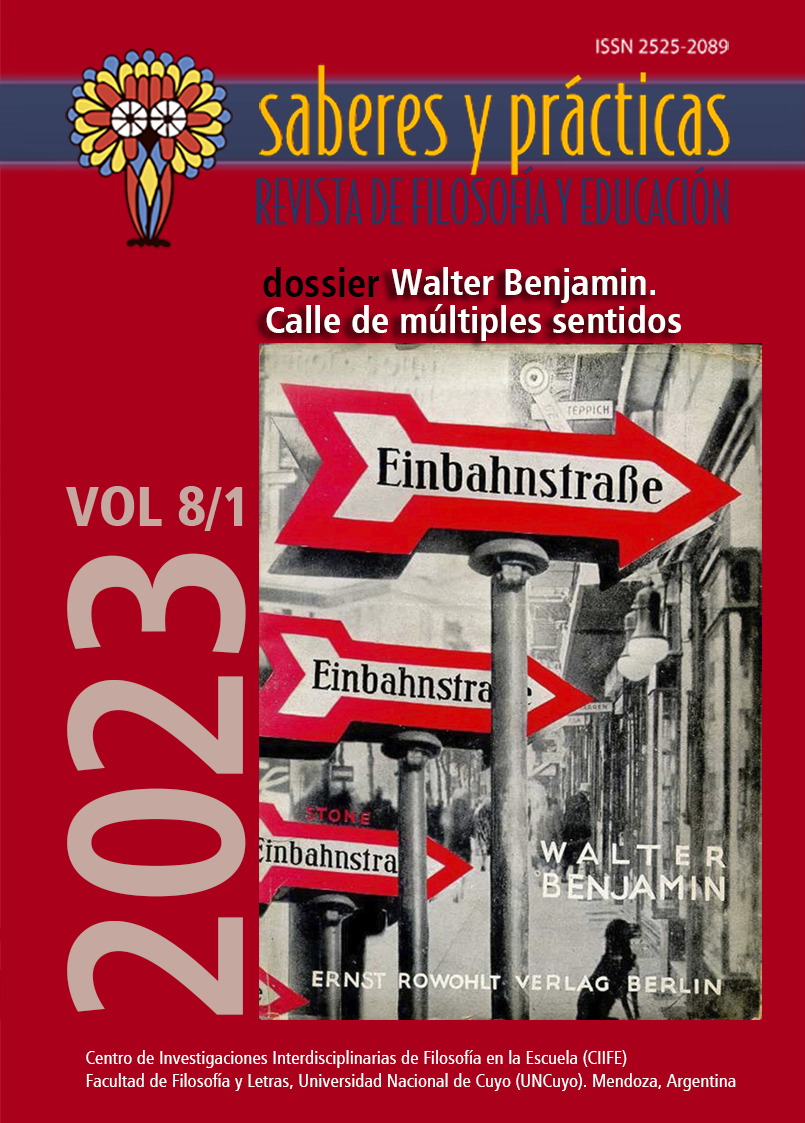Bejamin's flâneur as a skeumorphism of today's hacker
DOI:
https://doi.org/10.48162/rev.36.106Keywords:
Flâneur, skeumorphism, hacker, Internet, shockAbstract
This article brings back the potentiality of one of Walter Benjamin´s main figures: the flâneur, one of the main characters in Charles Baudelaire´s poetry, through the light of the effects that some of the mayor advancements in technology have caused in today´s cities. It analyzes some of the main paths that authors such as Steven Shaviro, Manuel Castells and Katherine Hayles have explored around the development of Internet and Artificial Intelligence. It does so, in order to actualize some of Benjamin´s concerns, as well as some of his productions in order to think strategies and/or tools so we can wake up, such as it is thought by Benjamin.
Downloads
References
Allan Poe, E. (1970). Cuentos 1. Alianza.
Baudelaire, C. (2000). El spleen de París. Fondo de Cultura Económica.
Baudelaire, C. (1999). Les fleurs du mal. Visor.
Benjamin, W. (2014). Baudelaire. ABADA.
Benjamin, W. (20003). La obra de arte en la época de su reproductibilidad técnica. Ítaca.
Benjamin, W. (1999). Ensayos escogidos. Coyoacán
Benjamin, W. (2007). Libro de los pasajes. Akal.
Barrios F. y Filippini S., (2021). De cuando Marx importunó a Lacan. Una genealogía del plus-de-jouir. Escolios.
Boden, M. A., (2016). Inteligencia artificial. Turner publicaciones.
Burroughs, W., (2006). Yonqui. Anagrama.
Carrión, J., (2021). Membrana. Galaxia Gutenberg.
Castells, M., (2001). La galaxia internet. Areté.
Debord, G., (1995). La sociedad del espectáculo. Naufragio.
Deleuze G. y Guattari F., (1996). Lo actual y lo virtual en Dialogues. Nouvelle.
Dick, P., (2020). Ubik. Minotauro.
Freud, S., (1976) Más allá del principio del placer. Obras Completas. Tomo XVIII. Amorrórtu.
Hafner, K. and Markoff J. (1991). Cyberpunk. Outlaws and Hackers on the Computer Frontier. Touchstone.
Haraway, D., (1995). Ciencia, cyborgs y mujeres. Cátedra.
Haraway, D., (2018). Manifiesto para cyborgs. Ciencia y tecnología y feminismo socialista a finales del siglo XX. Letra
Sudaca.
Haraway, D., (2020). Manifiesto cyborg. Kaótica.
Hayles, K., (2020) How we became posthuman. Virtual bodies in cybernetics, literature and informatics. University Chicago Press.
Hayles, K., (2020). The Cosmic Web. Scientific Models and Literature Strategies in the 20th
Century. Cornell University Press.
Lacan, J., (1971). El estadio del espejo como formador de la función del yo (je) tal como se nos revela en la experiencia psicoanalítica. Siglo XXI.
Preciado, P.B. (2022). Dysphoria mundi. Anagrama.
Semo, I. (2023-04-13) Deseo y delirio en internet. La Jornada. https://www.jornada.com.mx/notas/2023/04/13/politica/deseo-y-delirio-en-internet/?from=page&block=politica&opt=articlelink
Shaviro, S., (1999) Connected, or What It Means to Live in the Network Society. University of Minnesota Press.
Published
How to Cite
Issue
Section
License
Copyright (c) 2023 Helena Maldonado Goti
This work is licensed under a Creative Commons Attribution-NonCommercial-ShareAlike 2.5 Argentina License.





















